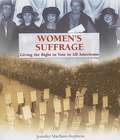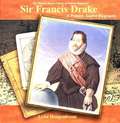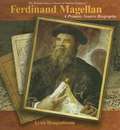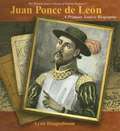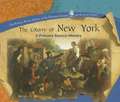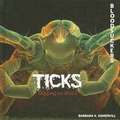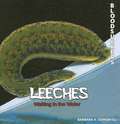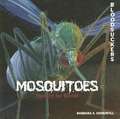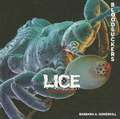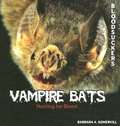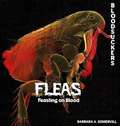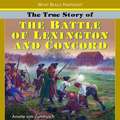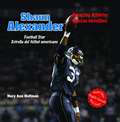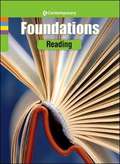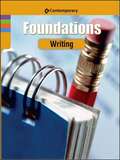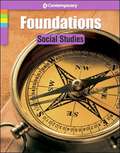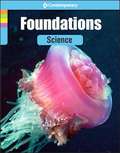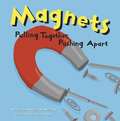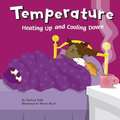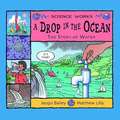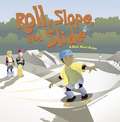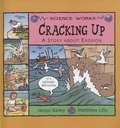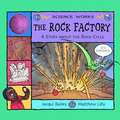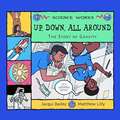- Table View
- List View
Women's Suffrage: Giving the Right to Vote to All Americans
by Jennifer Macbain-StephensIt is the account of the struggle for women's suffrage, or the right to vote that was passed in August 1920 for American women.
Sir Francis Drake: A Primary Source Biography (Primary Source Library Of Famous Explorers)
by Lynn HoogenboomDetails the life and exploits of Sir Francis Drake, an early English slave-trader and pirate who successfully sailed around the world.
Ferdinand Magellan (A Primary Source Biography)
by Lynn HoogenboomThis book traces the life and exploits of the Portuguese explorer who sailed under the Spanish flag, challenged mutinies and located a waterway between the South American continent and the island at its southern tip, providing quicker passage to the Pacific
Juan Ponce De Leon: A Primary Source Biography
by Lynn HoogenboomDetails the life and exploits of the Spanish explorer who sailed among the islands of the Caribbean.
The Colony of New York: A Primary Source History (The Primary Source Library of the Thirteen Colonies and the Lost Colony)
by Melody S. MisFrom the discovery of the island of Manhattan and the founding of a tiny Dutch trading village, to New York's emergence as one of the world's most influential cities, the history of the colony of New York is traced through primary source documents.
Ticks: Digging for Blood (BloodSuckers)
by Barbara A. SomervillYoung readers will be fascinating as they learn how ticks dig for the blood of other animals for nourishment. This engrossing book explores the habitats, hunting patterns, life cycles, and varieties of ticks.
Leeches: Waiting In The Water (Bloodsuckers Ser.)
by Barbara SomervillYoung readers will be fascinating as they learn how leeches suck the blood of other animals for nourishment. This engrossing book explores the habitats, hunting patterns, life cycles, and varieties of leeches.
Mosquitoes: Hungry for Blood (Bloodsuckers)
by Barbara SomervillYoung readers will be fascinating as they learn how mosquitoes feast on the blood of other animals for nourishment. This engrossing book explores the habitats, hunting patterns, life cycles, and varieties of mosquitoes.
Lice: Head Hunters (Bloodsuckers)
by Barbara SomervillYoung readers will be fascinating as they learn how lice hunt the blood of other animals for nourishment. This engrossing book explores the habitats, hunting patterns, life cycles, and varieties of lice.
Vampire Bats: Hunting for Blood (BloodSuckers)
by Barbara SomervillYoung readers will be fascinating as they learn how vampire bats feast on the blood of other animals for nourishment. This engrossing book explores the habitats, hunting patterns, life cycles, and varieties of bats.
Fleas: Feasting On Blood (Bloodsuckers #4)
by Barbara SomervillYoung readers will be fascinating as they learn how fleas feast on the blood of other animals for nourishment. This engrossing book explores the habitats, hunting patterns, life cycles, and varieties of fleas.
The True Story of the Battle of Lexington and Concord
by Amelie Von ZumbuschThis book presents an overview of the first battle of the American Revolution in Massachusetts on April 19, 1775.
Shaun Alexander Football Star Estrella del futbol americano
by Mary Ann Hoffman Eduardo AlamanBrief biography of the football running back, Shaun Alexander.
Contemporary Foundations: Reading
by McGraw-HillContemporary's Foundations series helps students improve their basic skills. Each book provides skill instruction, offers interesting passages to study, and furnishes opportunities for practice. Foundations provides meaningful contexts for learning, using language which is easy to understand. About Foundations: Reading, Revised Edition: Foundations: Reading will help students improve their reading ability, as well as their writing and thinking skills. Foundations: Reading is divided into four units: Practical Reading: ''survival'' reading that you do everyday. Practical reading includes instructions, advertisements, and explanations. Reading Nonfiction: writing based on facts. Nonfiction includes newspaper and magazine articles, books about real people and real events, and encyclopedia articles. Reading Poetry: verse that captures a person's feelings. Learning to recognize form, rhythm, rhyme, and images will help you read and appreciate poetry. Reading Short Fiction: stories created from an author's imagination. Characters, setting, plot, and theme are important elements in every story. These special features in Foundations: Reading will help students practice language skills: Writing Workshops: detailed instructions that will guide the student through the four-step writing process: prewriting, drafting, revising, and editing Language Tips: explanations, pronunciations, study hints, and background information that will help the student understand what he or she is reading Test Skills: a reminder that this skill is often tested on standardized tests Posttest: a test, evaluation chart, and answer key, to gauge the mastery of each skill. Revised Edition Features: New language tips, Updated content, including revised passages, updated graphs and images, More exercises. About the Series: In Foundations: Reading, students will read practical information, nonfiction, poetry, and short stories. They will learn to find the main point and the details; identify fact, opinion, and bias; make inferences; read photographs and cartoons; and understand rhythm, rhyme, plot, and theme. Writing Workshops, Language Tips, and prereading questions are designed to improve reading, writing, and thinking skills. In Foundations: Writing, students will practice the four steps to writing an essay: prewriting, drafting, revising, and editing. They will read and write five kinds of essays: descriptive essays, personal narratives, how-to essays, essays of example, and comparison-and-contrast essays. A language-skills workbook provides grammar, punctuation, and sentence structure practice. In Your Journal, With a Partner, and Language Tips will help students become better writers, and better readers and thinkers as well. In Foundations: Science, students will learn about the human body, plant biology, physics, chemistry, and Earth science. They will practice putting events in order; reading diagrams, charts, and graphs; using the scientific method; and making comparisons and contrasts. Try It yourself! activities will guide students through simple experiments so they will have a better understanding of what they have been reading about. Writing Workshops and Language Tips will help students use their reading and writing skills to think about science topics. In Foundations: Social Studies, students will learn about world history, U.S. history, civics and government, geography, and economics. They will summarize, make predictions, infer the main idea of cartoons, find information on maps, and read various kinds of graphs. Background Information, Language Tips, and Writing Workshops will let students use what they already know as they read and write about social studies topics. The revised edition includes a new World History chapter. In Foundations: Math, students will practice using whole numbers, money, decimals, fractions, ratios, and percents. Exercises will help students review the addition, subtraction, multiplication, and division facts; round numbers; estimate answers; and solve word problems. Math Notes, On their Calculator, and Language ...
Contemporary Foundations: Writing
by McGraw Hill Wright GroupContemporary'sFoundationsseries helps students improve their basic skills. Each book provides skill instruction, offers interesting passages to study, and furnishes opportunities for practice.Foundationsprovides meaningful contexts for learning, using language which is easy to understand. Foundations: Writingwill help students improve their writing skills, as well as their reading and thinking skills. Part I: Writing helps students practice the four stages of the writing process: Prewriting: planning and organizing Drafting: writing by following a plan Revising: evaluating and rewriting Editing: correcting grammar, mechanics, and usage Students will learn about five types of essays and practice writing each type: Descriptive Essay Personal Narrative How-To Essay Essay of Example Comparison-and-Contrast Essay Part II: Grammar focuses on language skills that writers need to understand. Grammar: nouns, pronouns, verbs, adjectives, and adverbs Punctuation: periods, question marks, exclamation marks, commas, and semicolons Sentence Structure: incomplete sentences, run-on sentences, and comma splices The following special features will help students practice their writing skills. In Your Journal: ideas to think about and write about on your own Language Tip: explanations, pronunciations, study hints, and background information that will help students understand what they read Test Skills: a reminder that this skill is often tested on standardized tests With a Partner: reading, writing, and thinking activities to do with a classmate, family member, or friend Posttest: a test, evaluation chart, and answer key to guage skill mastery Revised Edition Features: New language tips Updated content, including revised passages, updated graphs and images More exercises About the Series: In Foundations: Reading, students will read practical information, nonfiction, poetry, and short stories. They will learn to find the main point and the details; identify fact, opinion, and bias; make inferences; read photographs and cartoons; and understand rhythm, rhyme, plot, and theme. Writing Workshops, Language Tips, and prereading questions are designed to improve reading, writing, and thinking skills. In Foundations: Writing, students will practice the four steps to writing an essay: prewriting, drafting, revising, and editing. They will read and write five kinds of essays: descriptive essays, personal narratives, how-to essays, essays of example, and comparison-and-contrast essays. A language-skills workbook provides grammar, punctuation, and sentence structure practice. In Your Journal, With a Partner, and Language Tipswill help students become better writers, and better readers and thinkers as well. In Foundations: Science, students will learn about the human body, plant biology, physics, chemistry, and Earth science. They will practice putting events in order; reading diagrams, charts, and graphs; using the scientific method; and making comparisons and contrasts. Try It yourself!activities will guide students through simple experiments so they will have a better understanding of what they have been reading about. Writing Workshops and Language Tips will help students use their reading and writing skills to think about science topics. In Foundations: Social Studies, students will learn about world history, U.S. history, civics and government, geography, and economics. They will summarize, make predictions, infer the main idea of cartoons, find information on maps, and read various kinds of graphs. Background Information, Language Tips, and Writing Workshops will let students use what they already know as they read and write about social studies topics. The revised edition includes a new World History chapter. In Foundations: Math, students will practice using whole numbers, money, decimals, fractions, ratios, and percents. Exercises will help students review the addition, subtraction, multiplication, and division facts; round numbers; estimate answers; and solve word problems. Math Notes, On their Calculator, and Language Ti...
Contemporary Foundations: Social Studies
by Wright Group/McGraw-HillContemporary'sFoundationsseries helps students improve their basic skills. Each book provides skill instruction, offers interesting passages to study, and furnishes opportunities for practice.Foundationsprovides meaningful contexts for learning, using language which is easy to understand. AboutFoundations: Social Studies, Revised Edition : In Foundations: Social Studies, students will learn about world history, U.S. history, civics and government, geography, and economics. They will summarize, make predictions, infer the main idea of cartoons, find information on maps, and read various kinds of graphs. Background Information,Language Tips, andWriting Workshops will let students use what they already know as they read and write about social studies topics. The revised edition includes a new World History chapter. About the Series: In Foundations: Reading, students will read practical information, nonfiction, poetry, and short stories. They will learn to find the main point and the details; identify fact, opinion, and bias; make inferences; read photographs and cartoons; and understand rhythm, rhyme, plot, and theme. Writing Workshops, Language Tips, and prereading questions are designed to improve reading, writing, and thinking skills. In Foundations: Writing, students will practice the four steps to writing an essay: prewriting, drafting, revising, and editing. They will read and write five kinds of essays: descriptive essays, personal narratives, how-to essays, essays of example, and comparison-and-contrast essays. A language-skills workbook provides grammar, punctuation, and sentence structure practice. In Your Journal, With a Partner, and Language Tipswill help students become better writers, and better readers and thinkers as well. In Foundations: Science, students will learn about the human body, plant biology, physics, chemistry, and Earth science. They will practice putting events in order; reading diagrams, charts, and graphs; using the scientific method; and making comparisons and contrasts. Try It yourself!activities will guide students through simple experiments so they will have a better understanding of what they have been reading about. Writing Workshops and Language Tips will help students use their reading and writing skills to think about science topics. In Foundations: Social Studies, students will learn about world history, U.S. history, civics and government, geography, and economics. They will summarize, make predictions, infer the main idea of cartoons, find information on maps, and read various kinds of graphs. Background Information, Language Tips, and Writing Workshops will let students use what they already know as they read and write about social studies topics. The revised edition includes a new World History chapter. In Foundations: Math, students will practice using whole numbers, money, decimals, fractions, ratios, and percents. Exercises will help students review the addition, subtraction, multiplication, and division facts; round numbers; estimate answers; and solve word problems. Math Notes, On their Calculator, and Language Tips will help students improve math skills. The revised edition of Math is a major revision. The language has been updated to make the material even easier to follow than before. Foundations series at a glance
Contemporary Foundations: Science
by Wright Group/McGraw-HillContemporary's Foundations series helps students improve their basic skills. Each book provides skill instruction, offers interesting passages to study, and furnishes opportunities for practice.Foundations provides meaningful contexts for learning, using language which is easy to understand. About Foundations: Science, Revised Edition : In Foundations: Science, students will learn about the human body, plant biology, physics, chemistry, and Earth science. They will practice putting events in order; reading diagrams, charts, and graphs; using the scientific method; and making comparisons and contrasts. Try It yourself! activities will guide students through simple experiments so they will have a better understanding of what they have been reading about.Writing Workshops and Language Tips will help students use their reading and writing skills to think about science topics. About the Series: In Foundations: Reading, students will read practical information, nonfiction, poetry, and short stories. They will learn to find the main point and the details; identify fact, opinion, and bias; make inferences; read photographs and cartoons; and understand rhythm, rhyme, plot, and theme. Writing Workshops, Language Tips, and prereading questions are designed to improve reading, writing, and thinking skills. In Foundations: Writing, students will practice the four steps to writing an essay: prewriting, drafting, revising, and editing. They will read and write five kinds of essays: descriptive essays, personal narratives, how-to essays, essays of example, and comparison-and-contrast essays. A language-skills workbook provides grammar, punctuation, and sentence structure practice. In Your Journal, With a Partner, and Language Tips will help students become better writers, and better readers and thinkers as well. In Foundations: Science, students will learn about the human body, plant biology, physics, chemistry, and Earth science. They will practice putting events in order; reading diagrams, charts, and graphs; using the scientific method; and making comparisons and contrasts. Try It yourself! activities will guide students through simple experiments so they will have a better understanding of what they have been reading about. Writing Workshops and Language Tips will help students use their reading and writing skills to think about science topics. In Foundations: Social Studies, students will learn about world history, U.S. history, civics and government, geography, and economics. They will summarize, make predictions, infer the main idea of cartoons, find information on maps, and read various kinds of graphs. Background Information, Language Tips, and Writing Workshops will let students use what they already know as they read and write about social studies topics. The revised edition includes a new World History chapter. In Foundations: Math, students will practice using whole numbers, money, decimals, fractions, ratios, and percents. Exercises will help students review the addition, subtraction, multiplication, and division facts; round numbers; estimate answers; and solve word problems. Math Notes, On their Calculator, and Language Tips will help students improve math skills. The revised edition of Math is a major revision. The language has been updated to make the material even easier to follow than before.
Magnets: Pulling Together, Pushing Apart (Amazing Science)
by Natalie M. RosinskyHave you ever wondered what makes magnets work? Magnets, by Natalie M. Rosinsky introduces many different kinds of magnets, such as motors, compasses, and Earth's magnetic poles. Clear text, vivid illustrations, fun facts, and simple experiments make this book a great introduction to magnets.
Temperature: Heating Up and Cooling Down
by Darlene R. Stille Sheree BoydAn interesting book on temperature with its characteristics and facts illustrated with examples in the form of activities.
A Drop In The Ocean: The Story Of Water (Science Works)
by Jacqui Bailey Matthew LillyFollows a drop of water as it cycles from droplet to vapor and back to water and describes its journeys in between. Includes activity.
Roll Slope and Slide A Book About Ramps: A Book About Ramps (Amazing Science: Simple Machines)
by Michael DahiThis book enumerates the different types of ramps in nature, at work and at play.
Cracking Up: A Story About Erosion (Science Works)
by Jacqui Bailey Matthew LillyDescribes the process of erosion, how weather and water wear away the earth's surface, and what happens to the materials that are worn away.
The Rock Factory: The Story About the Rock Cycle (Science Works)
by Jacqui Bailey Matthew LillyDescribes how stones form inside the earth, work their way to the surface, and eventually are found by a young boy.
Up, Down, All Around: A Story of Gravity (Science Works)
by Jacqui Bailey Matthew LillyExplains the concept of gravity by taking a trip on the space shuttle. Lexile Measure: 0700
If You Were A Preposition (Word Fun Ser.)
by Nancy Loewen Sara GrayIf you were a preposition, you would connect a noun or pronoun to other words in a sentence. You could go WITH you friends INTO the movie theater. What else could you do if you were a preposition?
